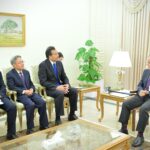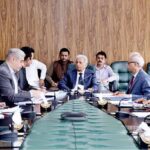ISLAMABAD, May 19 (APP): The National Commission on the Status of Women (NCSW) in Pakistan has called upon women all over the world to support the candidacy of Dr. Sania Nishtar of Pakistan for Director General of the World Health Organization.
A 2016 Credit Suisse Research Institute analysis of over 3,000 companies revealed that a global average of just 13.8% of senior management positions (defined as CEO or reporting to the CEO) were occupied by women. Within the UN system, only 23% of programmes, funds, specialized agencies or other entities are currently led by women, a press release of the National Commission on the Status of Women issued here Friday said.
More than 350 women and global health advocates from more than 40 countries have already signed the declaration of support. “After the election of the UN Secretary General and other senior positions going to men, women and health advocates around the world are eager to see the world’s leading health organization led by an extremely qualified woman,” said Khawar Mumtaz, Chairperson of the NCSW.
With the election being held on May 23 in Geneva, Dr Nishtar’s campaign appears to be picking up momentum at exactly the right time.
“Sania has a vision and a bold voice. The combination of her experience both globally as well as on the front lines in the health sector make her a formidable contender for the Director General position at WHO.
But more than that, Sania’s selection to the top will signify that capable women can and will change the way the world operates,” said Sharmeen Obaid Chinoy, a Pakistani journalist, activist and Oscar-winning filmmaker.
The declaration also reflects the support of a diverse group of global health leaders from every region of the world who work on pandemic preparedness, infectious diseases, health systems and noncommunicable diseases, as well as global health advocates, who have united behind Dr. Sania Nishtar’s candidacy.
“Sania has been a champion for women. Like the many women
who have signed onto this declaration, I know that Sania
will transform women’s health through the advocacy and reforms
that she’ll implement as Director-General of the WHO,” said Dr. Musumbi Kanyoro, President and CEO of the Global Fund for Women.
As the country’s first female cardiologist and a federal minister who enacted unprecedented reforms, Dr. Nishtar improved the capacity of Pakistan’s health system to deliver for women and girls.
And in her role as founding chair of the
Independent Accountability Panel of the United Nations for the Global Strategy for Women’s and Children’s health, she worked to ensure that a key global women’s health initiative would be transparently implemented and hold global health leaders and actors accountable.
As HRH Princess Dina Mired of Jordan notes, “Dr. Nishtar is the only candidate that has looked at health challenges through virtually every lens and has the all-around experience as an internationally respected medical doctor, civil society leader, former cabinet minister, thought leader, and technical expert, making her uniquely positioned to lead in the SDG era and tackle the multi-faceted health problems that the world now faces.”
“Through the results she has achieved-both at the national level in Pakistan and on a global scale- Dr.Nishtar has been a demonstrated change maker for women,” said Khawar Mumtaz. “This declaration is a reflection of the impact she has had and the enormous potential of what she could accomplish as Director- General.”
Her election would also provide a valuable yet under represented perspective, as she would be one of only eight women to currently head one of the 32 UN specialized agencies, funds, programmes or other entities, and just the third leader (and only woman) overall from the Eastern Mediterranean (EMRO) Region.
Given not only her own gender, but also her staunch commitment to gender equality, electing Dr. Nishtar would help WHO advance its goal of achieving gender parity at all levels, from its global headquarters to country offices around the world.
Int’l women deceleration adds to momentum behind Dr Sania Nishtar’s WHO bid






